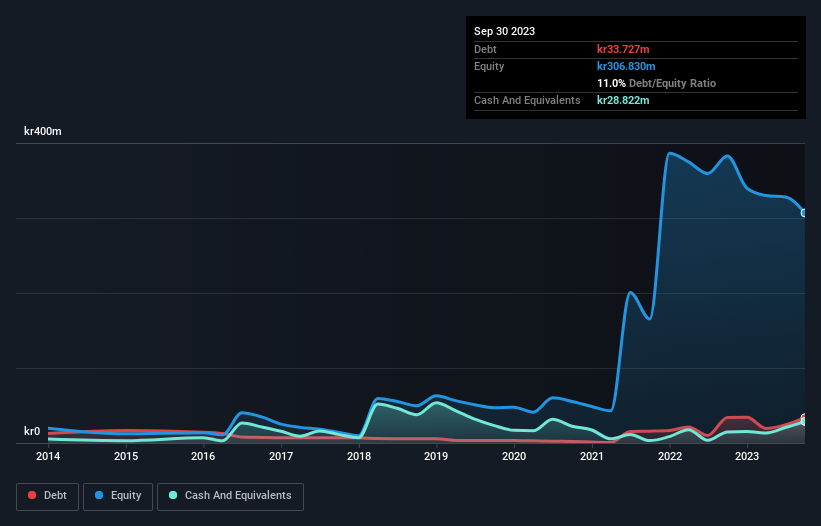
Howard Marks put it nicely when he said that, rather than worrying about share price volatility, 'The possibility of permanent loss is the risk I worry about... and every practical investor I know worries about.' So it might be obvious that you need to consider debt, when you think about how risky any given stock is, because too much debt can sink a company. Importantly, Acuvi AB (STO:ACUVI) does carry debt. But the more important question is: how much risk is that debt creating?
What Risk Does Debt Bring?
Debt assists a business until the business has trouble paying it off, either with new capital or with free cash flow. In the worst case scenario, a company can go bankrupt if it cannot pay its creditors. While that is not too common, we often do see indebted companies permanently diluting shareholders because lenders force them to raise capital at a distressed price. Of course, plenty of companies use debt to fund growth, without any negative consequences. When we examine debt levels, we first consider both cash and debt levels, together.
View our latest analysis for Acuvi
What Is Acuvi's Net Debt?
As you can see below, Acuvi had kr33.7m of debt, at September 2023, which is about the same as the year before. You can click the chart for greater detail. On the flip side, it has kr28.8m in cash leading to net debt of about kr4.91m.

How Healthy Is Acuvi's Balance Sheet?
We can see from the most recent balance sheet that Acuvi had liabilities of kr100.7m falling due within a year, and liabilities of kr64.5m due beyond that. Offsetting this, it had kr28.8m in cash and kr47.1m in receivables that were due within 12 months. So it has liabilities totalling kr89.3m more than its cash and near-term receivables, combined.
Acuvi has a market capitalization of kr208.6m, so it could very likely raise cash to ameliorate its balance sheet, if the need arose. However, it is still worthwhile taking a close look at its ability to pay off debt. There's no doubt that we learn most about debt from the balance sheet. But it is Acuvi's earnings that will influence how the balance sheet holds up in the future. So when considering debt, it's definitely worth looking at the earnings trend. Click here for an interactive snapshot.
In the last year Acuvi wasn't profitable at an EBIT level, but managed to grow its revenue by 30%, to kr201m. With any luck the company will be able to grow its way to profitability.
Caveat Emptor
Despite the top line growth, Acuvi still had an earnings before interest and tax (EBIT) loss over the last year. Its EBIT loss was a whopping kr64m. Considering that alongside the liabilities mentioned above does not give us much confidence that company should be using so much debt. So we think its balance sheet is a little strained, though not beyond repair. Another cause for caution is that is bled kr23m in negative free cash flow over the last twelve months. So in short it's a really risky stock. The balance sheet is clearly the area to focus on when you are analysing debt. But ultimately, every company can contain risks that exist outside of the balance sheet. Case in point: We've spotted 2 warning signs for Acuvi you should be aware of, and 1 of them shouldn't be ignored.
Of course, if you're the type of investor who prefers buying stocks without the burden of debt, then don't hesitate to discover our exclusive list of net cash growth stocks, today.
New: Manage All Your Stock Portfolios in One Place
We've created the ultimate portfolio companion for stock investors, and it's free.
• Connect an unlimited number of Portfolios and see your total in one currency
• Be alerted to new Warning Signs or Risks via email or mobile
• Track the Fair Value of your stocks
Have feedback on this article? Concerned about the content? Get in touch with us directly. Alternatively, email editorial-team (at) simplywallst.com.
This article by Simply Wall St is general in nature. We provide commentary based on historical data and analyst forecasts only using an unbiased methodology and our articles are not intended to be financial advice. It does not constitute a recommendation to buy or sell any stock, and does not take account of your objectives, or your financial situation. We aim to bring you long-term focused analysis driven by fundamental data. Note that our analysis may not factor in the latest price-sensitive company announcements or qualitative material. Simply Wall St has no position in any stocks mentioned.
About OM:ACUVI
Acuvi
Provides components and systems solutions for motion and positioning in Sweden and internationally.
Excellent balance sheet low.
Market Insights
Community Narratives




